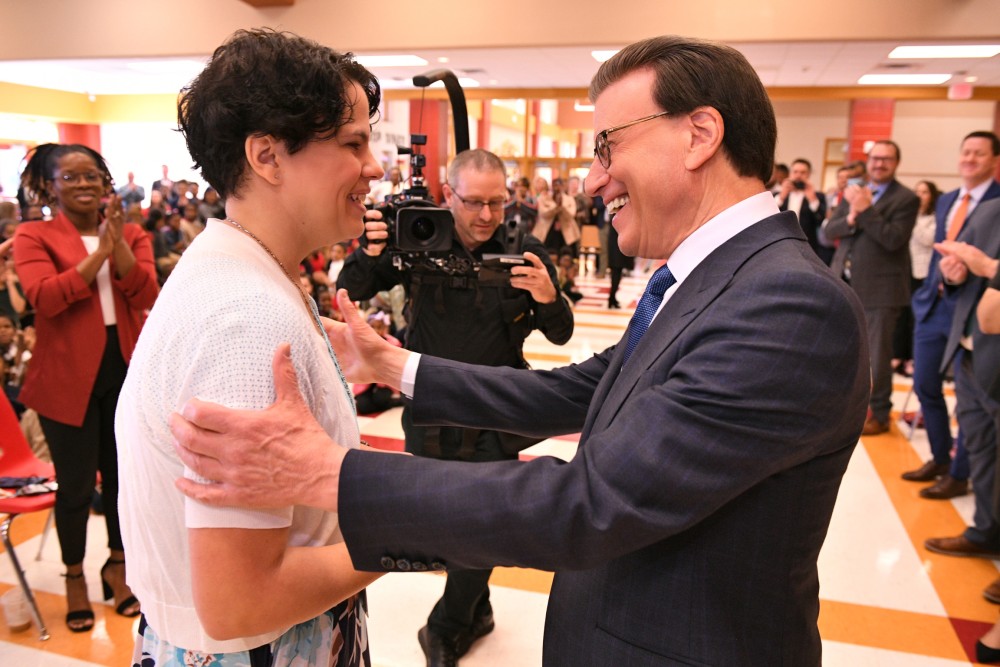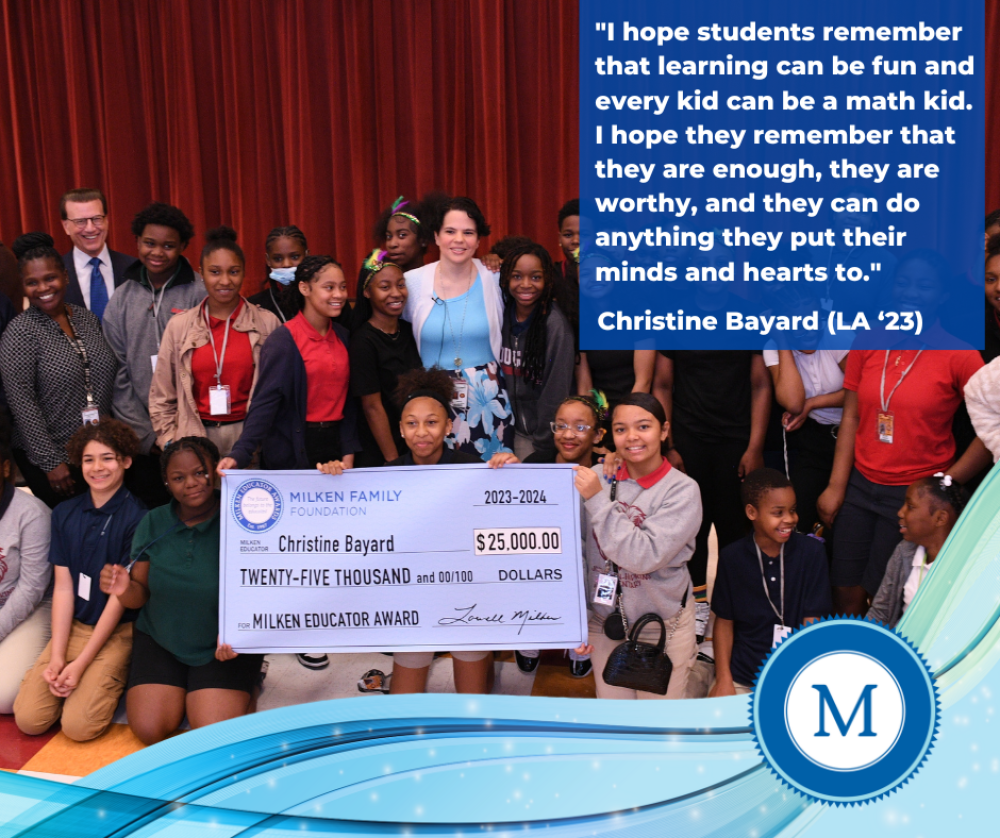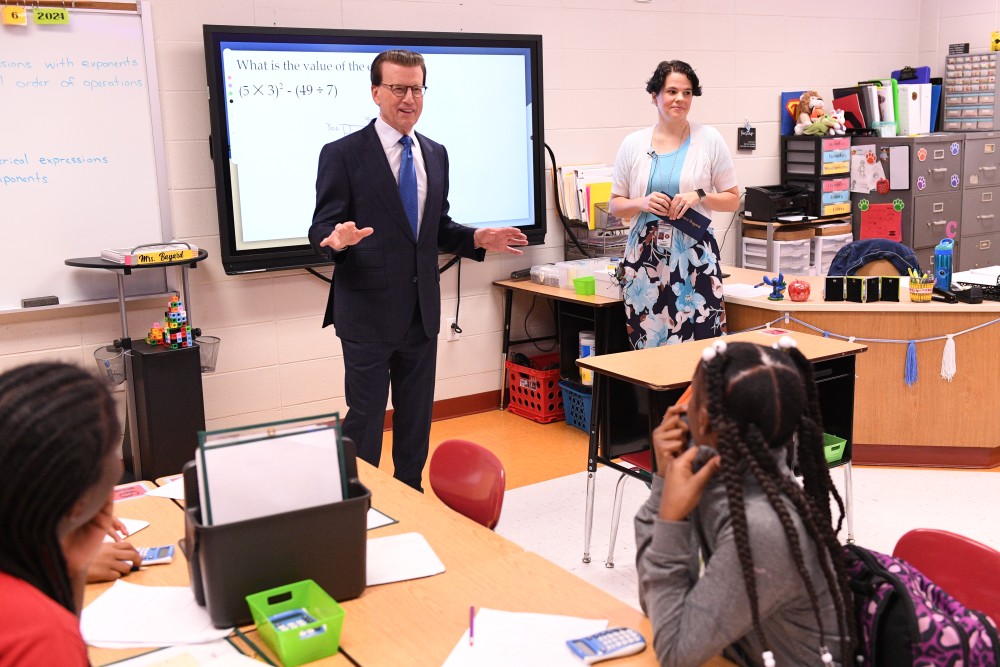Spotlight: Christine Bayard (LA '23)
August 23, 2024
Louisiana Milken Educator Christine Bayard keeps students engaged in her classroom with strategic games like "mathketball," where teams work through rigorous math problems to earn prizes and bragging rights. As founder of the JHOP math club, she's seen many success stories firsthand, where members go on to score mastery on the state math assessment and return back to the school to discuss their love for math. "I hope students remember that learning can be fun and every kid can be a math kid. I hope they remember that they are enough, they are worthy, and they can do anything they put their minds and hearts to." Christine received a 2023-24 Louisiana Milken Educator Award in New Iberia on February 6, 2024.
Milken Family Foundation: How have students responded since your Milken Educator Award surprise?
Christine Bayard (LA '23): In the weeks after my award surprise, every time I would walk the hallways of my school, many students from various grade levels would wave to me or come up and hug me. I teach sixth grade, so it was heartwarming when even the little kindergarten, first, and second grade students would run up to me in the hallways. I received many cards, notes of congratulations, and emails from former teachers, students and colleagues.
MFF: Who are your role models as an educator?
Bayard: My role models as an educator are: my mom and aunts, who have all been educators in the same parish I currently teach in; my sister-in-law who also teaches math;l and various colleagues who have taught me so much throughout my career. Additionally, I have had many amazing administrators and master teachers throughout my career. Many of them made it out to my notification and were in tears as they told me how proud they are of everything that I have accomplished.
I have had many great teachers in my life. My fondest memories were of the gifted teachers who noticed that I needed more challenging and engaging work. I also had middle and high school teachers who would create engaging lessons that went beyond the normal curriculum — that was always the best way that I could learn.
MFF: Tell us about your first year of teaching.
Bayard: My first year of teaching was rough, but enlightening. I began my career at a high poverty school in my parish with only a degree in psychology, six months of classes in my alternative certification program, and no classroom experience. As a first year teacher, I was also taking two night classes per semester while married, with a 1-year-old child at home. To say that I was busy was an understatement. I immediately sought out mentors to help me understand the curriculum and classroom management. I found those mentors in my master teacher who helped me with lesson planning; co-teachers who helped me with everyday procedures; and a computer lab manager who helped me learn to be tough but caring with my students. I remember how difficult it was to learn how to be an effective teacher, but I also remember how much fun I had with that first group of kids and how I missed them when they moved on from sixth grade onto their next chapter in life.
I, of course, cannot forget to mention the role that my husband played in all of this. I know that without him I would not be the teacher that I am today. He helped me balance my work and home life to make it manageable as a first year teacher and still does to this day.

MFF: What do you hope students remember from their time with you?
Bayard: I hope students remember that learning can be fun and every kid can be a math kid. I hope they remember to persevere through the hard things. I hope they remember that they are enough, they are worthy, and they can do anything they put their minds and hearts to.
MFF: What are some of the strategies you use in your classroom to keep students engaged and build their math fluency?
Bayard: One strategy that I use to keep students engaged is what I call “math experiences.” At the end of a topic or module, we will often do a math experience where I take an interesting problem or lesson and completely transform the classroom to bring it to life. There is a lesson where we add, subtract, multiply, and divide fractions to create our own virtual race cars. Students get to choose the body of the car, paint color and tires, then they have to calculate the car’s weight and speed. There is another lesson where we use our knowledge of rates and measurement conversion to calculate how long it would take to ride a horse to the moon. For each lesson I decorate the classroom, dress up in costume, and set out costumes for the students as well. This gets the students excited to use the skills we have been learning throughout the topic to perform this culminating activity.
Another strategy that I use is dice or card games that are a competitive way to practice math fact fluency. Students get excited to practice the math facts in a different way.
Lastly, a strategy that I use often for review days is what we call “mathketball.” Basketball is very popular at my school, so we created mathketball early in my career, which has been modified over time based on student suggestions. We use this as a group review activity where teams work together on rigorous math problems. If the team has the correct work and answer, they earn a point and a shot on the mathketball goal. Three lines are set up through my classroom which are worth one point, two points, or three points. They can choose where to shoot from. We keep track of the scores and the winning team earns bragging rights and a prize for their group.

MFF: Can you talk about how you’ve seen involvement in JHOP’s math club enrich students' academic experiences?
Bayard: When I founded the JHOP math club, it was created as an enrichment program to help boost the thinking and problem solving skills of some of my more advanced math students. We played math games and solved complex word problems to improve their problem solving skills through collaborative work. We even added to our agenda by tutoring other students in our school and organizing a STEAM night. Many of the members of our math club go on to score mastery or advanced levels on our state assessment in math. My favorite part is when those same students come back and tell me how much they love math now and wish they had math clubs at their middle or high school.
MFF: What advice would you share with people who are interested in becoming teachers?
Bayard: My advice to people who are interested in becoming teachers is to determine and follow your “why,” and always focus on the little moments that bring you joy. Find a mentor or multiple mentors that can give you advice from their multiple years of experience in the field. Make sure the mentors that you pick are positive and uplifting. Distance yourself from the negative people around you so that you can focus on the joyful moments.
MFF: Are you working on any interesting initiatives or new projects these days?
Bayard:I am developing a multi-step 10% bolder plan that will hopefully lead to some new projects. I’m hoping to help recruit and retain teachers in my school and my parish. I am also hoping to bring STEM to my school and improve student achievement across all math and science classes.
Watch our interview with Christine Bayard (LA '23) on the day of her Milken Award notification:
Don’t miss any new articles and updates from Milken Educator Awards:


